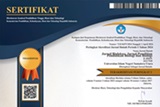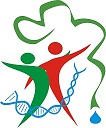Reevaluation of methanol extract from Phoenix dactylifera var. sukkari fruit’s potential against acne-inducing bacteria
Abstract
One of the natural ingredients that is often developed as an antibacterial product is the date palm (Phoenix dactylifera). However, scientific evidence regarding the effectiveness of the antibacterial compounds contained in dates needs to be evaluated, considering that several previous studies have reported that dates are more dominant as antioxidants than as antibacterials. Therefore, it is necessary to reevaluate the antibacterial ability of the methanolic extract of the sukkari variety date palm against the three test bacteria that cause acne, namely P. acnes, S. epidermidis and S. aureus. This research aimed to determine the sensitivity of the three bacteria tested in response to the methanol extract of the sukkari dates. This research design is experimental. The samples tested were sukkari and the tested bacteria were P. acnes, S. epidermidis and S. aureus. Dates were extracted by maceration method and made in concentrations of 50%, 60%, 70%, 80% and 90%. Positive control was chloramphenicol antibiotic while negative control was sterile distilled water. All treatments including control (+) and (-) were given to the test bacteria using the Kirby Baeur method to see the diameter of the zone of inhibition of the test bacteria growth. The data was processed in tabular form and compared with the 2016 CLSI standard to see the sensitivity response of the test bacteria. Results of this research is the sukkari dates extract with concentrations of 50%, 60%, 70%, 80% and 90% was able to inhibit the growth of P. acnes, S. epidermidis and S. aureus bacteria with an interval of 7.0-10.0 mm in diameter of the zone of inhibition. All the tested bacteria showed a sensitivity response in the resistant category, so the sukkari dates fruit extract is not the main choice to be developed as a natural anti-acne product.
Keywords
Full Text:
PDFReferences
Abdillah, M. M., Nazilah, N. R. K. & Agustina, E. (2018). Identification of active substance in ajwa date (Phoenix dactylvera L.) fruit flesh methanol extract (retracted). Biotropic: The Journal of Tropical Biology, 1(1), 23–31. https://doi.org/10.29080/biotropic.2017.1.1.23-31.
Adedayo, M., Ajiboye, A. & Adetula, F. (2020). Antibacterial screening of Phoenix dactylifera L. (date palm) seed extracts on some bacterial isolates associated with dental caries. Journal of Biological Research & Biotechnology, 18(2), 1127–1134.
Al-Zoreky, N. S. & Al-Taher, A. Y. (2015). Antibacterial activity of spathe from Phoenix dactylifera L. against some food-borne pathogens. Industrial Crops and Products, 65, 241–246. https://doi.org/10.1016/j.indcrop.2014.12.014
Albab, L. U., Husin, A.U., Azhali, A. B., Respati, T., & Astuti, I.D.R. (2020). Efek antibakteri ekstrak aquades buah kurma (Phoenix dactylifera L.) varietas ajwa terhadap Staphylococcus aureus secara in vitro. Jurnal Integrasi Kesehatan & Sains, 2(2), 135–139. https://doi.org/10.29313/jiks.v2i2.5769
Ammar, N. M., Abou El-Kassem, T. L., El-Sayed, H.N., Calabria, M.L., & Mabry, J.T. (2009). Flavonoid constituents and antimicrobial activity of date (Phoenix dactylifera L.) seeds growing in Egypt. Medicinal and Aromatic Plant Science and Biotechnology, 3(1), 1–5.
Cahyono, W. (2013) Aktivitas antibakteri kombinasi ekstrak etanol daun sirih merah (Piper crocatum Ruiz and Pav) dan kloramfenikol terhadap bakteri Salmonella typhi, Shigella dysenteriae, dan Staphylococcus aureus beserta bioautografinya. [Skripsi tidak dipublikasikan]. Universitas Muhammadiyah Surakarta.
Clinical and Laboratory Standard Institute (CLSI) (2016). M100S: Performance standards for antimicrobial susceptibility testing 26th edition. 950 West Valley Road, Suite 2500 Wayne, PA 19087 USA.
Hasanah, N. & Novian, D. R. (2020). Daya hambat ekstrak daun belimbing wuluh (Averrhoa bilimbi L.) terhadap bakteri penyebab jerawat (Propionibacterium acnes), Journal Ilmiah Farmasi, 9(1), 46–53.
Hastjarjo, T. D. (2019). Rancangan Eksperimen-Kuasi, Buletin Psikologi, 27(2), 187-253. 10.22146/buletinpsikologi.38619.
Maged, N. Q. A. & Abbas, N. A. (2013) Antibacterial activity of Phoenix dactylifera L . leaf extracts against several isolates of bacteria. Kufa Journal for Veterinary Medical Sciences, 4, 45–50.
Masfiyah, M. & Rahayu, R. (2019). Perbedaan zona hambat ciprofloksasin dengan ekstrak kurma (Phoenix dactylifera) terhadap bakteri gram negatif secara in vitro. Media Farmasi Indonesia, 14(2), 1517–1521.
Meer, S., Akhtar, N., Mahmood, T. & Igielska-Kalwat, J. (2017). Efficacy of Phoenix dactylifera L. (Date Palm) creams on healthy skin, Cosmetics, 4(2), 1-8. https://doi.org/10.3390/cosmetics4020013
Mihoub, F. Gourchala, F. & Lakhdar-Toumi, S. (2019). Bioactivity of algerian palm dates Phoenix dactylifera L. Ukrainian Food Journal, 8(2), 249–259. https://doi.org/10.24263/2304-974x-2019-8-2-5
Raja, S. K., Taip, S.F., Azmi, Z.M.M. & Shishir, I.R.M. (2019). Effect of pre-treatment and different drying methods on the physicochemical properties of Carica papaya L. leaf powder. Journal of the Saudi Society of Agricultural Sciences, 18(2), 150–156. https://doi.org/10.1016/j.jssas.2017.04.001
Ridha, A. (2021). Uji aktivitas antibakteri ekstrak etanol daun mangga kasturi (Mangifera casturi) terhadap pertumbuhan bakteri Escherichia coli dan Methicillin-resistant Staphylococcus aureus (MRSA), Indonesian Journal of Pharmacy and Natural Product, 5(1), 1-8.
Saleh, F. & Otaibi, M. (2013). Antibacterial activity of date palm (Phoenix dactylifera L.) fruit at different ripening stages, Journal of Food Processing & Technology, 04(12), 1-6. 10.4172/2157-7110.1000285
Utami, P. R., Indrayati, S. & Hayatang, N. (2021). Ability of ethanol extract from ajwa and sukkari dates (Phoenix dactylifera L.) in inhibiting the growth of Methicillin-Resistant Staphylococcus aureus (MRSA). Indonesian Journal of Medical Laboratory Science and Technology, 3(1), 1–8. https://doi.org/10.33086/ijmlst.v3i1.1848
Wardania, A. K. Malfadinata, S. & Fitriana, Y. (2020). Uji aktivitas antibakteri penyebab jerawat Staphylococcus epidermidis menggunakan ekstrak daun ashitaba (Angelica keiskei). Lumbung Farmasi: Jurnal Ilmu Kefarmasian, 1(1), 14-19. https://doi.org/10.31764/lf.v1i1.1206
Yonanda, C. R., Wahyuni, D. & Murdiyah, S. (2016). Pengaruh Ekstrak Etanol Daun Belimbing Wuluh (Averrhoa bilimbi L.) Terhadap Daya Hambat Staphylococcus epidermidis. Prosiding Seminar Nasional Pendidikan Biologi II.
Zahrah, H., Mustika, A. & Debora, K. (2018). Aktivitas antibakteri dan perubahan morfologi dari Propionibacterium Acnes setelah pemberian ekstrak Curcuma Xanthorrhiza. Jurnal Biosains Pascasarjana, 20(3), 1-3. https://doi.org/10.20473/jbp.v20i3.2018.160-169
DOI: http://dx.doi.org/10.30821/biolokus.v5i2.1363
Refbacks
- There are currently no refbacks.
Copyright (c) 2023 Jurnal Biolokus: Jurnal Penelitian Pendidikan Biologi dan Biologi
indexed by :












